Debbie Harry and Shirley Manson: ‘Every woman has awful experiences. That’s what men don’t understand’

Walking onstage to “a great burst of approval, before you even touch the mic” is the rock’n’roll dream. But living legend status sits uneasily with a punk scrapper like Debbie Harry. At 75, the Blondie frontwoman says that “fighting for approval suited me”. She misses the jeopardy of the bored or hostile crowds she faced at the beginning, she tells me, when Blondie were supporting bands like Rush in 1979. At one gig on that tour she was pelted with glow sticks and had a bottle hurled at her head, but doggedly snarled her way through the full, 13-song setlist before drummer Clem Burke tipped over his kit to shield the band from the incoming missiles, leaving Harry to make her exit with a “F*** You, Philadelphia!”
When I call Harry in New York to discuss Blondie’s 2021 tour with Garbage, I ask if there's a part of her that still wants to shock us. There’s a long pause down the crackly line. Then: “Hmm. Ha. Yeah. I guess I do. Sometimes I dream about walking on stage with no clothes on and feeling very comfortable with that…”
This revelation doesn’t surprise Garbage’s Shirley Manson, who notes that Harry “moves differently to most other women on stage. She’s uniquely uninhibited, especially for such a beautiful woman and she is always, by far, the most beautiful woman in any room. Beautiful women usually try to make everybody around them feel comfortable by dampening their brightness. They don’t show their humour and intellect. They try not to take up too much space. But Debbie is f***ing funny, wry and not very self-conscious. When she’s performing, there are moments that feel so wild that it’s extraordinarily exciting. That combination of unpredictability and beauty is lethal.”
Manson has had decades to study Harry by now. Both “loudmouth” women fronting otherwise male bands, they first met back in 1990, when Manson was playing keyboards in her first band, Goodbye Mr MacKenzie, supporting Blondie’s European tour. Harry was instantly struck by the “magnificent” Manson because the rest of her band were pogoing and the “powerful, charismatic” young Manson stood stock still, scrutinising the giddy crowd.
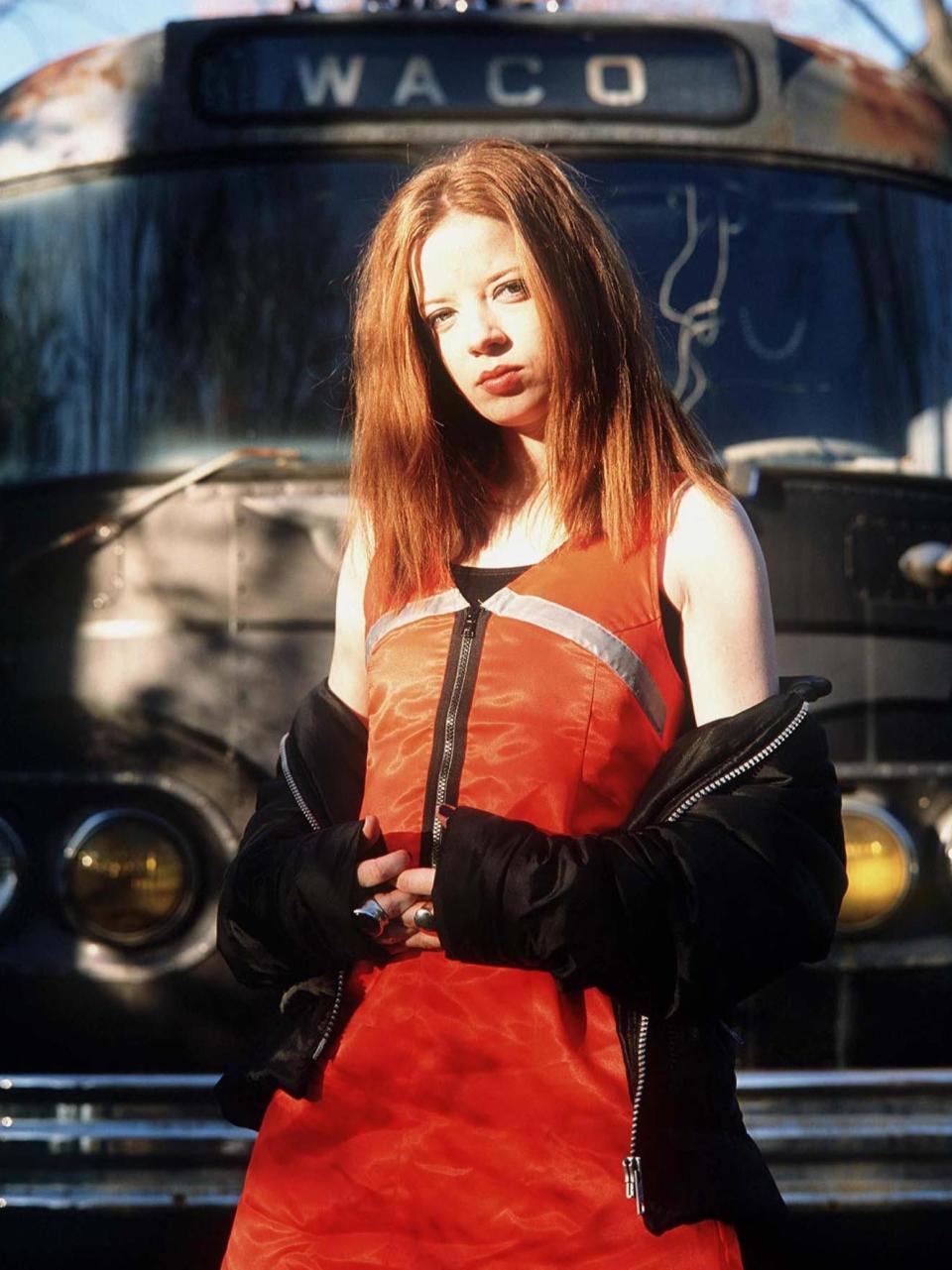
Shirley Manson in 1996
RexHarry tells me that she recognised a kindred spirit. “You put Shirley in a situation that’s a bit dicey or unaccepting and she will make it work. That’s what we do.” For many years, they had the same manager, Gary Kurfirst, who encouraged the Scottish singer to start Garbage with a bunch of Wisconsin-based blokes in 1994.
Manson tells me that “I’m not easily impressed. I can keep my s*** together with most people. But Debbie leaves everyone starstruck. One of my bandmates once fell into a large rubbish bin, not seeing it in his path, because he was so consumed by watching her walk towards him in a corridor. He was trying so hard to be cool. He just managed to say ‘Hiiiii…’ then toppled straight over.”
Although both Harry and Manson both became pin-ups – appealing to outsiders and more mainstream fans alike – they both suffered from a degree of body dysmorphia as children. Both are survivors of traumatic sexual assaults.
Born in Edinburgh in 1966, Manson is the daughter of a university lecturer and a big-band singer. Her early childhood was happy. But the bullies at her secondary school targeted the red hair that would later become a chemically enhanced trademark. Their attacks on her appearance left her feeling “repulsive”. It didn't help, she adds, that in a misguided attempt to boost her confidence, her mum also told her: “You’re not as pretty as those other girls, but you’ve got a fabulous personality.” In the early days of her music career, she regularly spent hours in the toilet sobbing before photo shoots and only began to enjoy the sight of herself in the mirror after being part of a Calvin Klein modelling campaign in 1999.
Born in Florida in 1945 and adopted as an infant by a couple from New Jersey, the young Harry (also a natural redhead) struggled to see herself clearly, too. In her 2019 memoir Face It, Harry describes childhood ballet classes in which “I always felt very self-conscious because I was convinced I was too fat, which I wasn’t at all. I had an athletic body. But I wasn’t birdlike and delicate like all the little girls who looked so cute and perfect in their little tutus. I felt that I f***ed the whole thing up by being so chubby.”
Harry was a solitary child with a “misfit mind”. She enjoyed sneaking out to the woods to spook herself and then sneaking into the coal store to blacken her preppy clothes. She has written of seeing her first flasher when she was eight – “he made me feel like a fly on the edge of a spider-web” – and the teenage admirer who stalked her home. Although she quickly took control of her own sexuality, she was raped in the early Seventies. She was returning from a gig with boyfriend and bandmate Chris Stein, when a man held them up at knife-point and led them into their apartment. He tied up Stein and then Harry before ransacking their home. In her memoir, she said: “He piled up the guitars and Chris’s camera and then untied my hands and told me to take off my pants. He f***ed me. And then he said, ‘Go clean yourself,’ and left.” She added: “I can’t say that I felt a lot of fear. In the end, the stolen guitars hurt me more than the rape.”
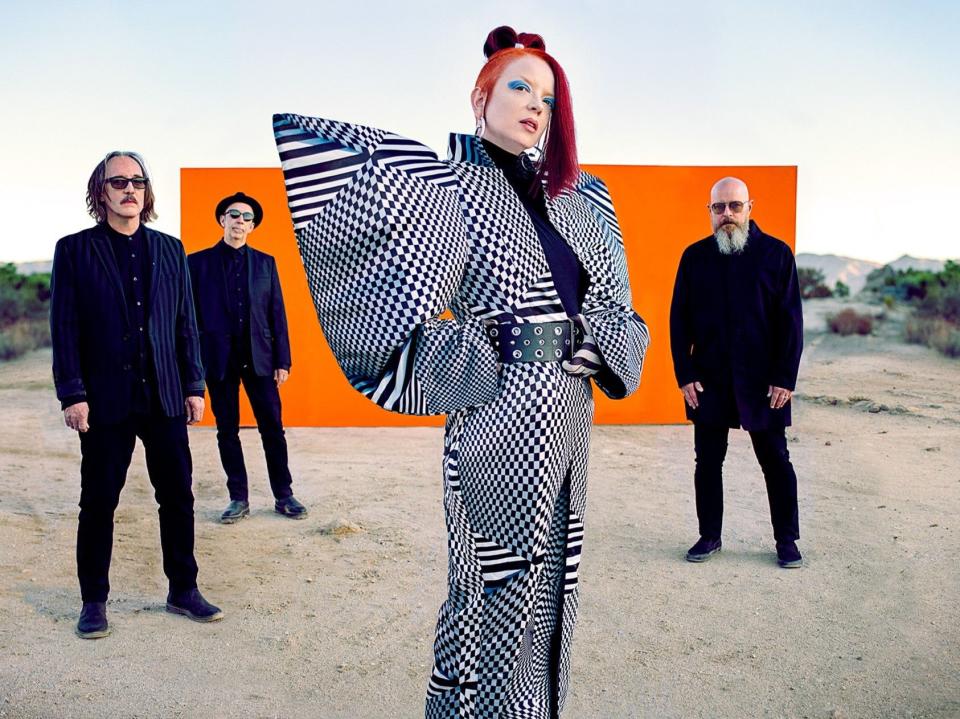
Manson with (from left) Butch Vig, Duke Erikson and Steve Marker, the Garbage line-up that remains intact after 27 years
Press imageIn 2016, Manson revealed that she was violently assaulted during her first sexual experience at the age of 13. “A boy fingered me,” she told the US press, “then grabbed a knife and told me he was going to stick it up my vagina. It frightened the shit out of me. I think that’s where it all began to unravel.” At 15, she began having sex with a school teacher in his van after class and only broke up the “relationship” when she found out he was also seeing other underage girls. Though she still considers that encounter to have been consensual, it’s part of what forged her sharp awareness of the power balance between the sexes. She’s now uniquely outspoken about both historic and ongoing sexual harassment in the music industry. Manson had her breast groped by a “fan” at a fashion shoot in 2017 and notes: “If that can happen to me, a well-known singer in her fifties, with the press all around me, then what is happening to the girl next door?”
Other fans are hard on the way female artists have chosen to speak about what has happened to them. As if Harry’s rape itself wasn't horrific enough, she was criticised online last year for “downplaying” the effects of her assault in her book.
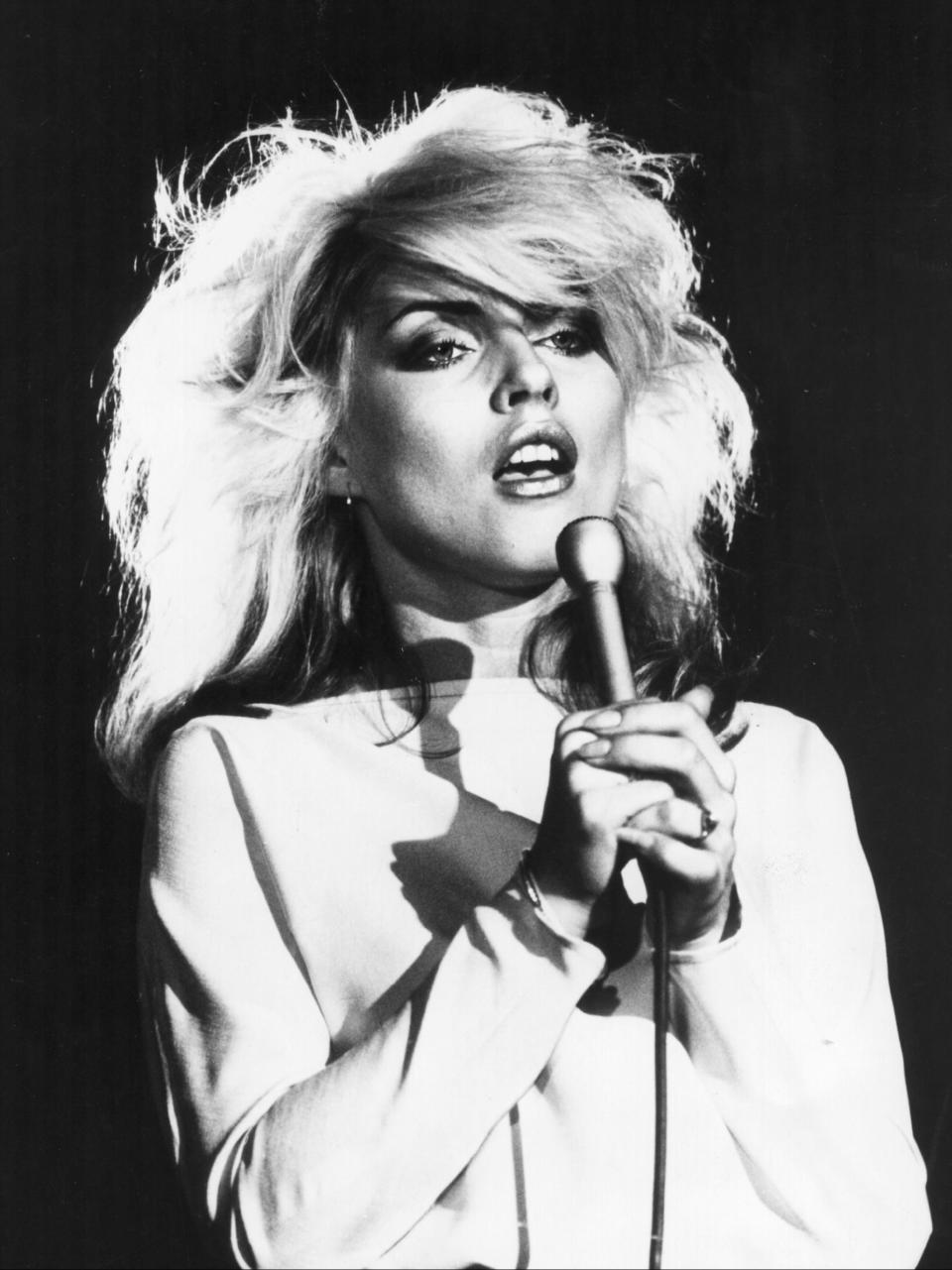
Debbie Harry performing in 1978
GettyToday Manson is angry at those who judge Harry for “how she has processed what happened to her. It was a different time. By the time I became a singer it had become very clear, societally, that no woman was ‘asking for it’. Debbie came up at a time when women were blamed for everything sexual that ever happened to them. I came from a different environment. But awful things still happened to me. Every woman has awful experiences. That’s what men don’t seem to understand. Every woman will have been frightened at some point. You feel vulnerable walking down the street, even in the daytime sometimes. Most men can’t relate to that.”
Manson and Harry both created stage personas to protect themselves. Harry tells me that being adopted allowed her to see her identity as flexible. “It gave me permission to look around, see different girls and different personalities and think; ‘Oh, I want to be like that, or like her… I didn’t have the same restrictive framework as other girls. I was frameless. That was a great luxury.”
Watching a documentary about David Bowie last year she tells me she was struck by the similarity between his approach to stagecraft and her own. “They said he was a chameleon. His first album didn’t go anywhere, and nobody got him. So he developed characters and became very popular. That’s what I did. I felt more comfortable portraying different characters. I’ve definitely had an actor-y approach to it all.”
The character she created to front Blondie was inspired by Marilyn Monroe (whom she liked to fantasise was her biological mother). In her memoir, she says she “was playing a character, the proverbial dumb blonde with the little-girl voice and the big-girl body… a woman playing a man’s idea of a woman… an inflatable doll but with a dark, provocative, aggressive side. I was playing it up, yet I was very serious.”
Having done a brief stint as a Playboy bunny, Harry knew how to camp up cartoon femininity, and play with the power balance of her sexuality. She tells me she “always had a strong, masculine side to me” and enjoyed flipping the classic male gaze in her songs. In hits like 1978’s “Picture This”, Harry sang that her finest hour was watching a male lover in the shower. It was a striking lyric that still has a challenging charge. “Oh!! Really, still?” she laughs. “Gee! Ya, gotta look at boys!”

Harry with Chris Stein in New York, 2014
GettyWhen I ask if the guys in Blondie had her back on lines like that, she laughs again, more dryly.
“In most cases they became reasonable. They saw it was a change that was coming. Great women like Gloria Steinem were biting back. I was around a lot of strong women who felt the same as me. But I wasn’t up there trying to champion women’s rights, y’know. F*** that! I was championing my own rights. I was trying to earn respect as a person and make what was on my mind available.”
Harry’s delight in opposition is part of what drove Blondie’s genre shifts from punk to disco (alienating the punk fans) and rock again (losing some disco devotees). She survived Blondie’s 1982 break-up, heroin addiction and the break-up with Stein that followed his near-fatal bout with an autoimmune disease in the early 1980s. Blondie reformed in 1997 and scored a UK No 1 single with “Maria” exactly 20 years after “Heart of Glass” became their first British chart-topper.
When I ask the secret of her enduring career she suggests: “A certain tenacity?” She credits her adoptive father with teaching her to look at “the relationship between art and commerce” from an early age and “look at the band like a business – when things aren’t working you need to be objective and work out why. I learned, very early on, not to pay too much attention to the press because journalists are just trying to write an interesting story. I don’t take it all that personally because it’s more about them than it is about me. But I’ve always enjoyed honest criticism, too. You need to listen to that. And then you need to please yourself.”
But Harry also concedes: “Age is a problem in my profession. It’s a four-letter word. Although I enjoy what I do more than ever, and I am better at my job, people look at me and there’s a fear factor. I make them aware of mortality. Although death is an inevitability and I guess it scares me too.”
Manson says that “grit” is what keeps Garbage going. “It helps that none of us came from hip city centres. None of us is cool and so Garbage has never been part of a scene. We were outliers. Mongrel rock, pop punks… We’re not even Scottish or American. When the press turned on us after our third album came out, it was very hard. But we were very careful with the band money, so we always had a recording fund, whether we had a label or not.”
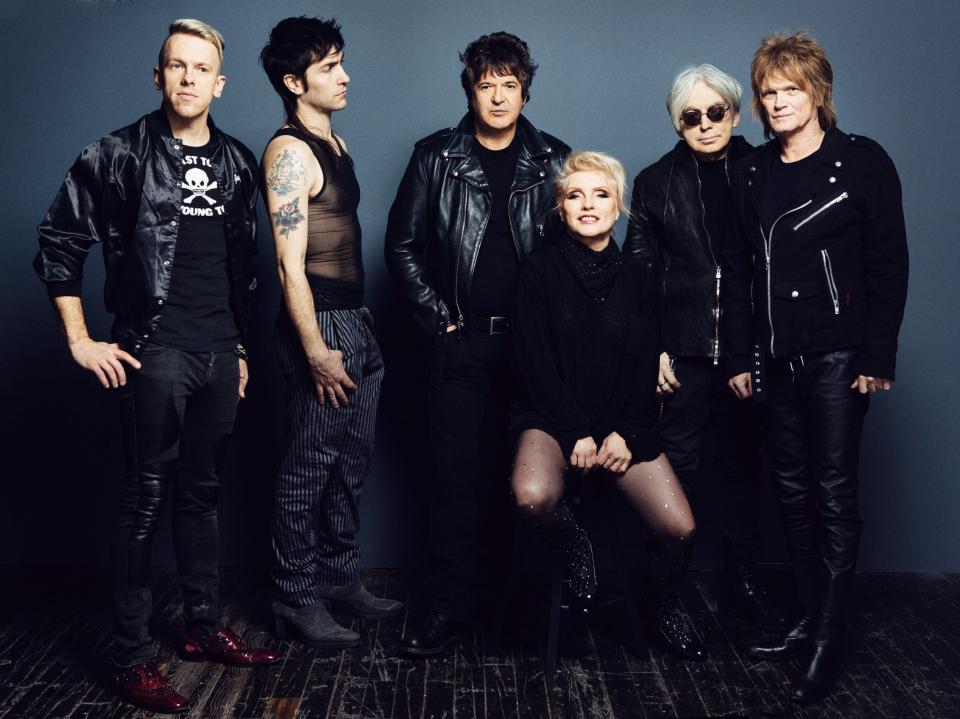
The 2020 incarnation of Blondie has been together for a decade: (from left) Tommy Kessler, Matt Katz-Bohen, Clem Burke, Debbie Harry, Chris Stein and Leigh Foxx
PressShe’s frank about the differences between her and her bandmates. “I find staying the same is tedious and the rest of the band are less interested in exploring. But I work well in teams and being a good communicator helps.” Are the guys equally good communicators? She laughs. “No comment!”
Unlike them, Manson had to struggle with being a “former sex symbol, ageing”. She tells me that: “Women are brainwashed from childhood to believe that the best years of their lives are when they are hot and sexy. When I hit 30 I do remember believing some weird s***.” She felt she should “tone down the make-up”, cover her flesh and stop wearing “unbecoming things”. But then she “started looking at Vivienne Westwood in see-through dresses and thinking: ‘that’s badass.’ And Dolly Parton, refusing to conform to how the world said she should present herself. They gave me permission to be myself although the culture wanted to shrink me.”
That inspiration fired Manson through her thirties. But, she says, “by 2006, I was stepping into my forties and I thought it was all over for me. I told people I was f***ed. Female musicians who have been viewed as sex objects don’t get a chance past a certain point.”
I’m uninterested in examining the surface because I see that all day. I want to explore what people hide and what they’re scared of
Shirley Manson
She got a third wind when her mother died. “She had been my support system. She had grown up in an institution [for orphans] until she was five which made her very people smart and she trained me, in a funny way, to shirk people’s desire to make me small. She taught me to reach for what fascinated me. Something about losing her fuelled me to continue on my own terms and that was the last jewel she left me as she departed this earth: she drove the little engine in me that helps me do what I love doing.”
And what Manson has always loved doing is using her music to address uncomfortable truths. “I am interested in the parts of people that swim under the surface. I’m uninterested in examining the surface because I see that all day. I want to explore what people hide and what they’re scared of.”
But she knows that “truth makes people uncomfortable and that can be hard for somebody like me who wants to make a connection. I think it might be easier to connect with lies. Look at Donald Trump. He’s made a huge connection with millions of Americans by lying and we need to take that very seriously. It’s been no fun living under a dictatorship.”
Although Manson has been “heartbroken” by the social divisions in both America (where she lives with her second husband) and her native Scotland, she feels “lucky to live in an era when we’ve broken down the binary ideas of gender which can be nothing but good for everybody on earth. I like the way the terminology is shifting. It takes the onus off of everyone to conform to these stereotypes they’ve been taught should apply to them. As we all get older we all grow out of those anyway, but now young people have permission to be themselves so much sooner.”
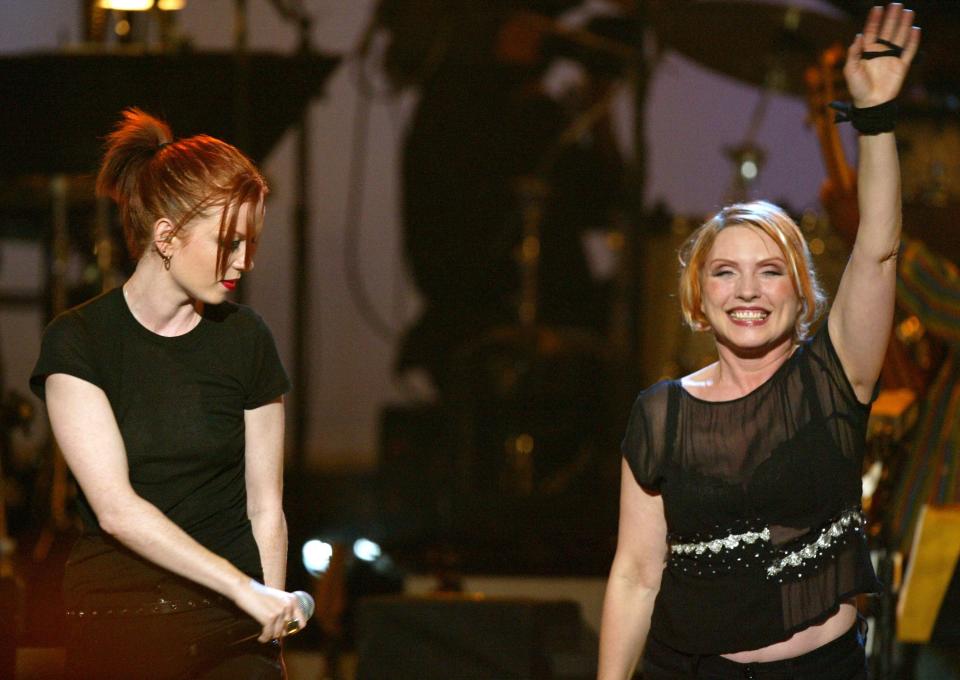
Women rock: Manson and Harry performing together in Los Angeles in 2004
GettyBoth Manson and Harry have been reading their way through the pandemic, choosing books that analyse the cultural shifts of the 21st century in which, Harry once sang, “things are gonna be much better for a girl like me”. Harry’s tackled Brian Stelter’s Hoax: Donald Trump, Fox News, and the Dangerous Distortion of Truth (examining how Trump-friendly Fox News played a role in the dissemination of misinformation about coronavirus) and Manson felt herself “shaken to the core” by Reni Eddo-Lodge’s Why I’m No Longer Talking to White People About Race.
But Harry’s had enough of lockdown and “living in a vacuum. I’ve been very careful and I’ve enjoyed the great masks I’ve been sent. I’ve got ones that read: ‘Hope’, ‘WHY?’ and ‘Stop F***ing the Planet’. And one that looks like a distorted version of my painted mouth, taken from a video still. That’s very cool and scary. But I miss the variety and all the people. I hope the situation soon changes so that the tour will go ahead. I’m so excited about getting back out there again.” Would she do it naked? “I’m not sure I’d actually DO that…” she mulls. “It might be fun, though.”
Blondie’s Against the Odds UK tour with special guests Garbage takes place in November 2021
Read More
Tori Amos: ‘America is a tyrannical situation in a supposed democracy’
Myha’la Herrold: ‘Black women have to be undeniable’
Miley Cyrus feels ‘trauma’ from intense scrutiny over her sexuality

 Yahoo News
Yahoo News 
